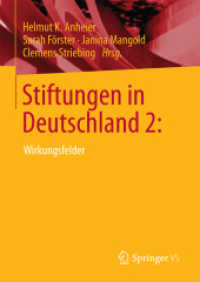Full Description
English historical linguistics is a subfield of linguistics which has developed theories and methods for exploring the history of the English language. This Handbook provides an account of state-of-the-art research on this history. It offers an in-depth survey of materials, methods, and language-theoretical models used to study the long diachrony of English. The frameworks covered include corpus linguistics, historical sociolinguistics, historical pragmatics and manuscript studies, among others. The chapters, by leading experts, examine the interplay of language theory and empirical data throughout, critically assessing the work in the field. Of particular importance are the diverse data sources which have become increasingly available in electronic form, allowing the discipline to develop in new directions. The Handbook offers access to the rich and many-faceted spectrum of work in English historical linguistics, past and present, and will be useful for researchers and students interested in hands-on research on the history of English.
Contents
Introduction Merja Kytö and Päivi Pahta; Part I. Framework: Section 1. Theories and Methodologies: 1. The variationist approach Suzanne Romaine; 2. Quantitative approaches to diachronic corpus linguistics Martin Hilpert and Stefan Th. Gries; 3. English historical pragmatics Gabriella Mazzon; 4. Construction grammar Graeme Trousdale; 5. Generative frameworks and approaches Elly van Gelderen; 6. Philological methods Robert D. Fulk; Section 2. Evidence: Material and Data: 7. Manuscripts and early printed books Simon Horobin; 8. Corpora and online resources in English historical linguistics María-José López-Couso; 9. Audio recordings Christian Mair; 10. Early and Late Modern English grammars as evidence in English historical linguistics Nuria Yáñez-Bouza; 11. Extracting data from historical material Erik Smitterberg; Part II. Analyses: Section 3. Perspectives on Processes of Change: 12. Phonological change in English Raymond Hickey; 13. Change in the English lexicon Christian Kay and Kathryn Allan; 14. Morphosyntactic change Olga Fischer; 15. Semantic and pragmatic change Susan M. Fitzmaurice; 16. Genre dynamics in the history of English Irma Taavitsainen; 17. Processes of sociolinguistic and sociopragmatic change Minna Nevala; 18. Standardization Joan C. Beal; 19. Contact-related processes of change in the early history of English Peter Trudgill; 20. Global spread of English: processes of change Marianne Hundt; Section 4. Highlighting the Research Process: 21. Variationist versus text-linguistic approaches to grammatical change in English: nominal modifiers of head nouns Douglas Biber, with Jesse Egbert, Bethany Gray, Rahel Oppliger and Benedikt Szmrecsanyi; 22. Identifying micro-changes in a particular linguistic change-type: the case of subjectification Elizabeth Closs Traugott; 23. The OED and HTOED as tools in practical research: a test case examining the impact of loanwords on areas of the core lexicon Philip Durkin; 24. The individuality of English in the multilingual Middle Ages Tim William Machan; 25. Ambisyllabicity in English: present and past Donka Minkova and Kie Ross Zuraw; 26. Typological change: investigating loss of inflection in early English Cynthia Allen; 27. Third-person present singular verb inflection in Early Modern English: new evidence from speech-related texts Terry Walker; 28. Visual pragmatics: speech presentation and Middle English manuscripts Colette Moore.








